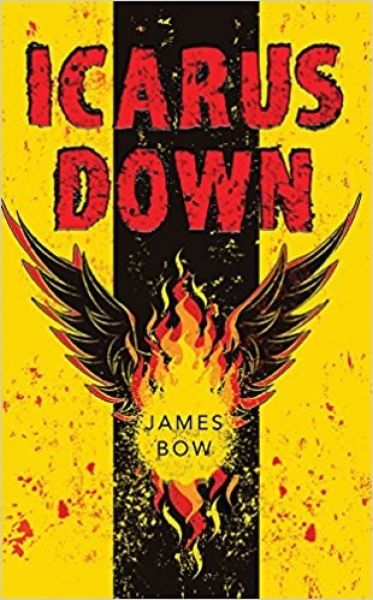Cover Me in Pretty Lies
Icarus Down
By James Bow

21 Apr, 2017
A Year of Waterloo Region Speculative Fiction
0 comments
To quote James Bow’s website:
I was born in downtown Toronto on April 19, 1972 and lived there until my folks moved up to Kitchener in 1991 so I could attend the University of Waterloo. I’ve lived in Kitchener ever since. I’ve been trained as an urban planner, and I’ve worked as a database manager, web designer, circulation manager, administrative assistant, layout designer, and office manager. The one consistent thing about my varied academic and professional career has been a love of writing.
Three generations ago, the colonists on the starship Icarus emerged from their final jump and found themselves plunged into disaster. The travellers had been promised a garden world. What they got was a hellworld whose electromagnetic environment killed electronics and where the sun was bright enough to burn unprotected skin. The fog-shielded lowlands seemed to offer a haven, … at least until the ticktock monsters attacked. The colonists were forced into refuges suspended between lethal sunlight and deadly monsters. Until now, they have survived.
Simon Daud wanted to be a pilot. Catastrophic equipment failure on his final test flight left Simon badly burned. His brother Isaac was killed outright.
Retrieved from the wreckage, Simon is given what therapy the colony still has available, then consigned to life as a low level communications officer. Instead of flying ornithopters, he services pneumatic tubes.
What happened to Simon and Isaac was tragic. It was also part of a greater pattern of failures. The colonists’ ingenious steampunk technology is increasingly unreliable. When it fails, their cities will be doomed.
A handful of extremists believe the only reasonable choice between “wait for the cities to fail as badly as did Simon’s airplane,” “relocate to the heights and be almost instantly burned alive,” or “settle the monster-filled lowlands” is the third option. Almost despite himself, Simon falls in with them.
It turns out there’s a fourth option: “find out who is deliberately engineering the failures and more importantly, why the saboteurs think this is a good idea.” And a fifth: “become the subject of a city-wide manhunt before getting trapped in the lowlands, waiting for the ticktock monsters to creep out of the fog.…”
~oOo~
I am not certain that this new world makes sense. It is just barely possible that we might see such a setting if we assume that the planet is on the cusp of going full-blown runaway greenhouse. Even then, I don’t see that the postulated temperature stratification could possibly happen.
The 72-year, 25,000 light-year journey the Icarus took suggests that human-habitable worlds are uncommon enough that even a pretty zippy space drive (able to cover Sol to Alpha Centauri in less than a week) takes decades to reach the nearest known world. If I’ve done the math right, there may be fewer than a dozen human-suitable worlds in the entire Milky Way [1].
It may seem unlikely to some readers that the colonists’ destination has complex life. Earth, after all, was populated by simple organisms for most of its existence. But Earth in the era before complex life would have been pretty hostile to us. Even post-Great Oxygenation Event, the Earth before the Cambrian Explosion would not have been an inviting target for human settlement. Rather than being an odd coincidence, the presence of complex life may be a prerequisite for human settlement. If complex life cannot flourish on a life-bearing world, then perhaps neither can we.
I think that the scarcity of even marginally habitable planets, and the immense distances between them, do explain why the colonists decided to stick it out on their new world. Even before the crash landing, it is not as if Icarus could just head to the next system when they found their new home had undocumented features. The choices were:
- head back an Earth that was in bad shape the last time they saw it (as Earth always seems to be in stories like this);
- make the best of the situation.
The specific methods they adopted were of course nasty but also predictable. Nothing says human like [rot13] trabpvqr.
It’s unfortunate for Simon that he’s a character in a young adult novel, because it’s a sure thing that even if he survives to the end of the book, many of his loved ones will not be so lucky. There is no guarantee that any of the people Simon befriends or falls in love with will make it to the end credits. In fact, the novel takes that a bit further; the narrative draws the reader’s attention to the fact the repercussions from decisions made decades ago will keep on playing out, that while today people may agree on peace and reconciliation, there is no guarantee they will make the same decision tomorrow. To quote Watchmen:
Adrian Veidt: […] It all worked out in the end.
Dr. Manhattan: ‘In the end’? Nothing ends, Adrian. Nothing ever ends.
While the author set his novel on another world, it’s all too clear which real life situations Bow had in mind (which situations, I will be coy about, as they are part of the explanation for the central mystery). At least it is to an adult readers; for some younger readers, this may be the first time they encounter these issues. Everyone starts somewhere….
Icarus Down is available here (Amazon) and here (Chapters-Indigo).
Note that that is Amazon.ca, not .com.
Fee free to comment here.
1: As it turns out, [rot13 for huge spoiler] gurer ner npghnyyl gjb unovgnoyr jbeyqf va gur gnetrg flfgrz naq gur pbybavfgf raqrq hc ba gur jebat bar.
